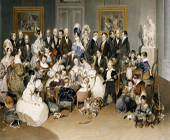Among the questions and commentaries that have come in the mail about the book, Return to Order, there were some very excellent questions by a very kind lady. It occurred to me that others might have the same questions and so I would like to reply.
Her questions could be summarized in the following manner: “When you say Return to Order, I would like to know if there has ever been a time in American history when we have even had a small amount of this Order [Logos], which we are asked to support, promote and return?”
The questioner continues: “Maybe the only time in the past where this order existed fully was some Christendom, some Christian Order in society in the Middle Ages before the Enlightenment. If this was the last time there was true Order in this world, then we need to know everything we can about it. However, I find that many of the things and times of the past that we try to ‘conserve’ may not have been so wonderful in the first place. How can we be sure this order was so wonderful?”
To this kind lady, I would reply:
We propose a return to order because we need not invent it. It already exists. It is an order that comes from the nature of man himself. It is valid for all times and all peoples. It is firmly based on the natural moral law. And although it applies to everyone, the Church is its best and most secure guardian.
This order is best found in what we call an organic Christian society – that same order that gave rise to Christendom – and the remnants of which persist even to our days.
An organic Christian society is our wellspring. It is where we came from. It is a society that historically existed and it reached an apex in medieval Christendom. In the words of Leo XIII:
“There was a time when the philosophy of the Gospel governed the states. In that epoch, the influence of Christian wisdom and its divine virtue permeated the laws, institutions, and customs of the peoples, all categories and all relations of civil society. Then the religion instituted by Jesus Christ, solidly established in the degree of dignity due to it, flourished everywhere thanks to the favor of princes and the legitimate protection of magistrates. Then the Priesthood and the Empire were united in a happy concord and by the friendly interchange of good offices. So organized, civil society gave fruits superior to all expectations, whose memory subsists and will subsist, registered as it is in innumerable documents that no artifice of the adversaries can destroy or obscure.” (Immortale Dei, n. 21.)
However, we do not advocate a return to an historical past but to the same principles that brought us so many of the institutions that are fast disappearing today – rule of law, representative government, traditional family and subsidiarity.
We call it an organic society because it is wonderfully adapted to our organic human nature, full of diversity and spontaneity that facilitates our life together in community. Such an order does not treat people like parts in a machine, but rather considers people as living and unique beings. Just like the organs of a body work together in unison to fulfill their goal, so also individuals and families work together in organic society toward the common good.
It is called Christian because we cannot adopt a naturalistic manner of organizing society. To work well, it must be founded upon Christian virtue. When virtues – especially the cardinal virtues of prudence, justice, fortitude and temperance – are practiced in this organic Christian society, everything enters into sync because each act is in accordance with its nature. To be truly Christian, it must also be founded in the shadow of the Cross so as to help us deal with life’s sufferings. This is the foundation for true order and also true progress and prosperity.
While America never enjoyed the complete expression of this Christian organic order, it had, and still has, significant remnants. Common Law, for example, was something we inherited from England, and is one of these precious remnants, compiling legal wisdom, customs (e.g. trial by jury), rights (e.g. habeas corpus) and maxims discovered and developed over centuries in England. The Cultural War we are in, relentlessly attacks and destroy these remnants. This leads us to both defend these remnants and call for this order’s full return.
Was this Christian organic order a perfect or idyllic order? No, like all things human it had its problems and defects. Our fallen nature always introduces sin and suffering into our lives. No order of any type can be entirely wonderful and we fool ourselves if we think we can construct a romantic order without tragedy.
However, an organic Christian order is that best suited to dealing with life’s tragedies as well as its joys. This order can make life purposeful and fulfilling. It takes into consideration both the effects of grace that pull us up and the reality of our fallen nature that drags us down. As a result, it adapts well to both the sufferings and joys that this vale of tears affords and can therefore provide us with some degree of true happiness.
And so, we do well to return to this organic Christian order – not just the remnants that still survive today but its fullest manifestation in Christendom. We do well to “conserve” this order knowing that it is not completely perfect but that it can provide a natural framework for true happiness amid our trials. Most important of all, this is something we can do now since a return to order is not about turning back the clock; it is about re-setting the clock based on timeless principles.




